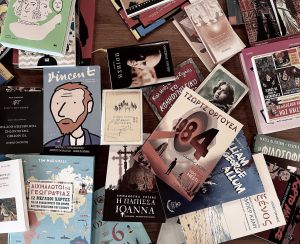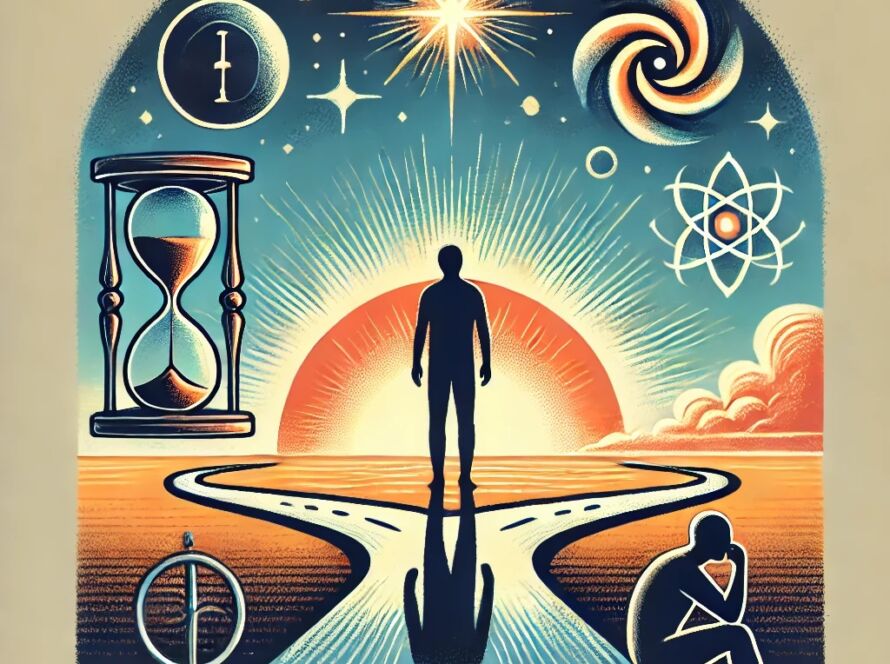Exploring the Depths of Human Consciousness
Recently, I had the immense privilege of participating in a book fair in Bondues, a charming village located in the north of France. This event, attended by over 15,000 visitors, featured the literature published over the past year. My invitation to this book fair was to present my book, “Quest for Meaning and Spiritual Intelligence”, a work delving into the heart of transpersonal psychology. At our stand, we were seven authors, each exploring various themes ranging from shamanism or feminine mysticism to the interpretation of chakras or a game inspired by the kabbalistic Tree of Life. This diversity testified to our common conviction: the paths to self-knowledge are multiple, allowing everyone to find the one that suits them.

Encounters with Souls in Search of Meaning
Our stand, slightly isolated from the others, offered an ideal setting for deep and personal discussions with visitors. Three encounters deeply marked me as they summarized the malaise experienced by many of our contemporaries and the answers that society offers them.
The first encounter was with a woman who believed that the house she had lived in for about thirty years had driven her husband to suicide and was causing her cancer. Ancient evil entities inhabited it. In response to my astonishment at her decision to stay there, she replied that she had decided to fight against these entities. From a transpersonal psychological perspective, I realized then that this woman had overcome life’s hardships by finding meaning in them; and her fight against the negative forces she believed were present had helped her overcome two simultaneous tragedies. Psychologically, whether these evil entities exist or not is of little importance. The fact that she found meaning facilitated her mourning and healing.
The second encounter was with a hypersensitive young man who found refuge in music. It seemed that music soothed his soul and disconnected him from reality. He was concerned about his niece, who shared this same sensitivity, but whose mother, the young man’s sister, calmed with medication upon a psychiatrist’s advice. The young man felt sorry about the situation, and I recommended him to talk to his sister. This young man’s story made me think of personalities too far from societal norms, who, not so long ago, were treated with electroshocks or lobotomy.
At the end of the fair, I met an elderly woman with long gray hair, who reminded me of the free and wild female figures I had encountered in California. A friend and co-exhibitor had done a card reading for her, revealing, according to him, a certain disincarnation. Personally, my conversation with her, though brief, made me think she was seeking her community. I had this intuition when her sad eyes lit up at the mention of my nomadic life between Europe and the United States. Had she chosen the wrong incarnation? If so, why, and how to escape this sadness?
Many people that I met in this book fair expressed discomfort and sometimes suffering, seeking answers to their questions through tarot readings, for example, or by searching for a guide who could help them in their moment of crisis. This meeting prompted me to reflect on the nature of evil, questioning whether evil forces are internal, external, or both. This led me back to my own research on the destructive potential inherent in humans and how higher forces can influence us. Are we free while we are building up belief systems to protect us? Do we have a destiny from which we cannot escape? Does happiness exist and how to achieve inner peace?
What to think of these life stories?
What I take away from this fair is the importance of the quest for meaning that was so well analyzed by Viktor Frankl, and which is so deeply rooted in the human psyche. Without understanding the meaning of one’s life, suffering sets in. Some people search for this meaning within themselves, dedicating themselves to an art or a mystical quest, while others look for a guide who could give them this meaning. Others still find battles to fight or causes to champion.
Of course, all of this is relative depending on the culture or latitude where you live: when immediate survival is at stake like feeding oneself or finding shelter, the quest for meaning becomes secondary and is overshadowed by the quest for survival.
But, finding the meaning of life and mission on earth is essential. For this, it is important to know oneself. Many tools allow this self-knowledge: astrology, alchemy, and Kabbalah are my favorite approaches, but there are others. For example, somatic psychology teaches us how to work on the body to heal the mind. These tools are merely gateways to the human psyche, ways of questioning the mind to purify the soul.
These meetings also raised many questions about consciousness, evil, and healing. There were also numerous discussions about the informational field in which we are immersed and that Rupert Sheldrake calls ‘Morphic Resonance’ and Erwin Laszlo ‘Akashic Fields’, which refer to the existence of a non-local consciousness of which the brain is merely a relay. Accessing this informational field would allow access to self-knowledge, but also to the understanding of our assigned place based on our personality. Numerous tools are at our disposal to access this field.
Conclusion
Participating in this fair was an intense experience in terms of encounters, with others, of course, but also with myself. From spectator, I became actor. I was able to put into practice what I wrote about spiritual intelligence: empathic and generative listening, critical thinking and Socratic questioning, intuition.
This fair was rich in meaning, with warm exchanges that acted both as mirrors of or windows on the soul depending on the discussions, a beautiful experience that confirms the biblical passage: ” Iron sharpens iron, and one man sharpens the face his neighbor” (Proverbs 27:17). This verse highlights the importance of relationships and human interactions for personal development and mutual improvement. It suggests that just as two blades of iron sharpen each other by rubbing against each other, individuals grow and improve through their interactions.



